Join Our Newsletter To Be Informed When New Videos Are Posted
Join the thousands of fellow Studends who rely on our videos to learn how to read the bible in Hebrew for free!
Hebrew Text
אִם אֶת־הַדָּבָר הַזֶּה תַּעֲשֶׂה וְצִוְּךָ אֱלֹהִים וְיָכָלְתָּ עֲמֹד וְגַם כָּל־הָעָם הַזֶּה עַל־מְקֹמוֹ יָבֹא בְשָׁלוֹם׃
English Translation
If thou shalt do this thing, and God command thee so, then thou shalt be able to endure, and all this people shall go to their place in peace.
Transliteration
Im et-hadavar hazeh ta'aseh vetzivcha Elohim veyachalta amod vegam kol-ha'am hazeh al-mekomo yavo veshalom.
Hebrew Leining Text
אִ֣ם אֶת־הַדָּבָ֤ר הַזֶּה֙ תַּעֲשֶׂ֔ה וְצִוְּךָ֣ אֱלֹהִ֔ים וְיָֽכׇלְתָּ֖ עֲמֹ֑ד וְגַם֙ כׇּל־הָעָ֣ם הַזֶּ֔ה עַל־מְקֹמ֖וֹ יָבֹ֥א בְשָׁלֽוֹם׃
אִ֣ם אֶת־הַדָּבָ֤ר הַזֶּה֙ תַּעֲשֶׂ֔ה וְצִוְּךָ֣ אֱלֹהִ֔ים וְיָֽכׇלְתָּ֖ עֲמֹ֑ד וְגַם֙ כׇּל־הָעָ֣ם הַזֶּ֔ה עַל־מְקֹמ֖וֹ יָבֹ֥א בְשָׁלֽוֹם׃
🎵 Listen to leining
Parasha Commentary
📚 Talmud Citations
This verse is not quoted in the Talmud.


Context of the Verse
This verse (Exodus 18:23) is part of Yitro's advice to Moshe regarding the establishment of a judicial system. Yitro suggests that Moshe delegate responsibilities to capable leaders to avoid burnout and ensure the people's needs are met efficiently. The phrase "וְצִוְּךָ אֱלֹהִים" ("and God command thee") indicates that Yitro emphasizes the necessity of divine approval for this structural change.
Rashi's Explanation
Rashi comments that Yitro's advice was conditional upon Hashem's approval. The term "וְצִוְּךָ אֱלֹהִים" implies that Moshe should seek divine confirmation before implementing the new system. Rashi also notes that "וְיָכָלְתָּ עֲמֹד" ("then thou shalt be able to endure") refers to Moshe's ability to sustain his leadership role without becoming overwhelmed.
Rambam's Perspective
In Hilchot Sanhedrin (1:1-2), Rambam derives from this verse the foundational principles of judicial delegation. He explains that Moshe's acceptance of Yitro's advice established a precedent for hierarchical courts (Sanhedrin and lower Batei Din), ensuring Torah law is accessible to all.
Midrashic Insights
Practical Lessons
The verse underscores key leadership principles in Jewish thought: